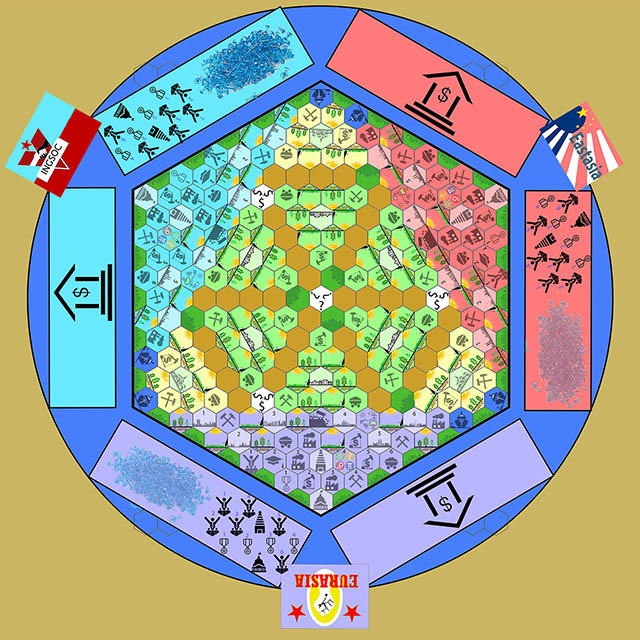
SATURDAY, NOV 7, 2020: NOTE TO FILE

The Game of Empire
A modest proposal
'There's no way I can single-handedly save the world or, perhaps, even make a perceptible difference — but how ashamed I would be to let a day pass without making one more effort.' — Isaac Asimov
Eric Lee, A-SOCIATED PRESS
TOPICS: GEORGE ORWELL, FROM THE WIRES, RULES OF THE GAME 
Abstract: The 'rules of the game', e.g. Monopoly or chess, select for its outcome: win, lose or (in chess) draw, the game always ends. 'We are playing a global endgame.' For organisms, GAME OVER means death or species extinction. Humans can play for centuries at building empires great and small while believing that their empire will be the exception to all prior bouts of empire building. Empires, like thunderstorms, are dissipative structures 'full of sound and fury', but they do not evolve. George Orwell envisioned the possibility of a world ruled by three somewhat benign (as in not metastatic) empires that limited conflict to deputed areas and if any one empire threatens to became dominate, the other two form an alliance to weaken it and help prevent the game from ending. If the social control systems of each sovereign state were 'perfected' such that civil war was not possible, then the pattern of empire building, of sustainable war, could persist much as a benign tumor can persist by not becoming metastatic beyond viable limits. [see Endgame 2184: The sustainable empire outcome]
Coos Bay (A-P) — Could a board game help humans understand their predicament and thereby be delivered from it? Empire building goes back 6-11 thousand years. Most humans on the planet (50+%) have been living within and serving empire for 3-4 thousand years (since global population reached 35+ million and most humans were living in complex societies above the chiefdom level). Today, 99+% of humans are products of or have recently been subsumed by a global techno-industrial society (aka Euro-Sino Empire) some three centuries in the raising as empowered by fossil fuels.
In the last two thousand years of empire building, more people (over 50 billion) have lived on the planet than had ever lived before on the planet since Homo sapiens became the last hominid standing. Hundreds of principalities, fiefdoms, dynasties, monarchies, kingdoms, caliphates, dukedoms, city-states, nation-states... have arisen, and all have climaxed and declined or collapsed (depending on one's perception of slow or rapid). Pre-climax, all who served their social system believed the future would be more of the same, i.e. more growth, development, expansion, and rising prosperity.
Humans build empires in response to short-term contingencies of self interest as enabled by technology without realizing the rules of the game select for its own GAME OVER. The rise and fall of empire may take centuries, and humans fail to respond to distant future outcomes they cannot believe in. Playing a board game that simulated the nature and course of empire, where one minute of game play is a year or decade in the vastly more complex real world game, could help to clarify the collective mind wonderfully.
 To viscerally understand empire, humans could play the board game Empire. We could invest in the education of humanity, beginning by age 12-15, by working to get one fifth of those old enough to play the game (and not too old to play the game) to play in a global tournament that models the course of empire of which we are all products of and serve.
To viscerally understand empire, humans could play the board game Empire. We could invest in the education of humanity, beginning by age 12-15, by working to get one fifth of those old enough to play the game (and not too old to play the game) to play in a global tournament that models the course of empire of which we are all products of and serve.
Playing Empire could be educational and make a difference if enough people play the game. If at all possible, get over 1,162,261,467 to play round 1 of a three player game of Empire that is a combination of Monopoly and chess.
We live in a monetary culture where all play for money, so don't just ask people to play Empire, pay them to:
- 387,420,489 win round 1 and get to play round 2. Each wins $10. Cost to humanity would be $3,874,204,890
- 129,140,163 win round 2 and get to play round 3 and win $20 each. Cost $2,582,803,260
- 43,046,721 win round 3 and get to play round 4 and win $40. Cost $1,721,868,840
- 14,348,907 win round 4 and get to play round 5 and win $80. Cost $1,147,912,560
- 4,782,969 win round 5 and get to play round 6 and win $160. Cost $765,275,040
- 1,594,323 win round 6 and get to play round 7 and win $320. Cost $510,183,360
- 531,441 win round 7 and get to play round 8 and win $640. Cost $340,122,240
- 177,147 win round 8 and get to play round 9 and win $1,280. Cost $226,748,160
- 59,049 win round 9 and get to play round 10 and win $2,560. Cost $151,165,440
- 19,683 win round 10 and get to play round 11 and win $5,120. Cost $100,776,960
- 6,561 win round 11 and get to play round 12 and win $10,240. Cost $67,184,640
- 2,187 win round 12 and get to play round 13 and win $20,480. Cost $44,789,760
- 729 win round 13 and get to play round 14 and win $40,960. Cost $29,859,840
- 243 win round 14 and get to play round 15 and win $81,920. Cost $19,906,560
- 81 win round 15 and get to play round 16 and win $163,840. Cost $13,271,040
- 27 win round 16 and get to play round 17 and win $327,680. Cost $8,847,360
- 9 win round 17 and get to play round 18 and win $655,360. Cost $5,898,240
- 3 win round 18 and win $1,310,720 per year if they can keep on playing the game. Cost $3,932,160/year
Many who didn't play in round 1 (about 80% of those who could have) will follow the tournament as would virtually all non-winners who had played the game. As a global educational experience, the tournament would be cost effective and, unlike real empire building, involve few or no deaths.
Total cost to maybe save the world in pay-outs: $11,610,818,190 plus $3,932,160/year. The UN and many NGOs could promote and administer the tournament, and there would be some added operational costs, but the world can afford to play the game (about 10% of annual beer sales in US alone) that informs humanity about the global game we are all playing.
There would be a period of determined outreach so even those living in remote villages could learn of the game and learn to play it. Determining the initial 387,420,489 winners could take a year or more, but the pace would pick up towards the end. The final three winners could live on different continents and so a day or so delay would be needed for transport to the United Nations to play Global Empire, the final round.
The final contestants would agree to play the game for 1-2 hours 365 times a year, though several sessions could be played in a day. Hundreds of millions would be interested in how they played the game sustainably. Lessons could be learned. Thinking could be occasioned. Hundreds of millions of humans could come to ask, 'And then what?'
Conjecture: The world doesn't want to understand the remorseless dynamic of short-term self interest all are trapped in and serve with varying degrees of enthusiasm. To understand the Anthropocene would be to be delivered from it. This would not be in our short-term self interest, so we will keep on playing the game of BAU because that is what the game selects for. Anyone who came to understand that the only way to win the game of Empire (like Russian roulette) was to not play the game, would stop playing it. If such an understanding could spread, some humans (perhaps 1%) could come to play by different rules, 'to seek out the condition now that will come anyway', that selected for a different outcome.
The Rules of the Game
The details of game play remain to be finalized, so critical input will be of high value. The game is an open source development project of the Naturocracy Alliance. No part of the game or ideas associated with it are propriatary. The game is offered as a gift. The game board not only can be made by individuals at low cost, made and played anywhere, but in tournament play no game board and pieces made and sold by a for-profit manufacturer can be used. The board contains icons but is language independent. Cards and instructions would need to be available in multiple languages, and paper is the only industrial product needed to play the game on a portable board. An online version, using the open source game engine Vassal, is possible, but those lacking internet access must not be marginalized. The rules, though under development, give a sense of how the game could be played. Consider, The Rules of the Game of Empire.
